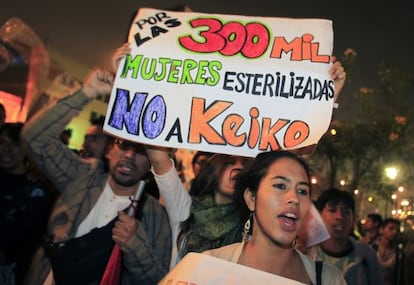Forced sterilizations still going unpunished in Peru
The UN criticizes lack of compensation for Fujimori-era victims

The last time that Peru went before the United Nations Human Rights Committee, in 2000, the country was emerging from eight years of authoritarian rule under Alberto Fujimori. In November 2000, the Committee expressed concern over reports it had received regarding “involuntary sterilizations, particularly of indigenous women in rural areas and women in the most vulnerable social sectors.”
Twelve years later, the same body is drawing attention to the same issue, more specifically on the lack of sanctions against the people who were responsible for birth control policy under Fujimori.
“Despite the significant number of years that have elapsed, the victims have still not received reparation, and the perpetrators have not been sanctioned,” read the conclusions of the committee that assessed Peru’s performance as a member state of the UN Covenant on Civil and Political Rights. The document was released in Geneva on March 28.
During the 2011 presidential elections, public mention of the forced sterilization cases hampered the campaign of Keiko Fujimori, daughter of the former president who is currently serving a 25-year prison sentence for crimes against humanity.
The prosecutor’s investigation into forced sterilization programs was reopened in 2012, although non-profit groups warned that if the state does not provide the right amount of funding and personnel, the complaints will be shelved just as they were in the past. UN experts have expressed similar concerns.
These violations are not being investigated or sanctioned”
“The Committee urges the State to speed up the investigation by providing sufficient economic, human and technical resources […] and ensuring that all victims receive proper forms of reparation without further delay.” In September 2011, Peru presented the UN with its fifth report as a member state of the Covenant on Civil and Political Rights. The document was due in October 2003. Last year, the government received specific questions from the expert committee in Geneva and was called in for a periodic examination there. The questioning took place on March 19 and 20, after which the committee drew up its conclusions.
Some of the recommendations include the implementation of a national therapeutic abortion protocol that has already been approved. “In other Latin American countries, therapeutic abortion is formally illegal, but in Peru it is formally legal but not properly implemented. We must emphasize the protection of the life and health of women; in this sense, it is a more serious problem,” said Gerald Neuman, one of the committee experts and a Harvard professor of International and Comparative Law. “A certain amount of Peru’s human rights problems stem from the fact that its rules say things that are coherent with international obligations, but it fails in the effective implementation of the law in reality, and therefore it is not meeting its obligations.”
This expert also noted that the UN committee is worried about “the frequency with which [Peru] declares a state of emergency, without justification, to deal with small, local protests.” He said that in this context, there have been excesses in the use of force by the police and the military. “These human rights violations are not being investigated or sanctioned,” he said in a telephone interview.
Just like Neuman, the Argentinean lawyer and committee member Fabián Salvioli underscored the risk of Decrees 1064 and 1065, which authorize intervention by the armed forces against a “hostile group,” which could “even apply to people armed with sticks or stones who do not deserve such a use of force.”
The committee’s conclusions also made a reference to the effects of the internal armed conflict and the fight against the terrorist group Shining Path between 1980 and 2000. The UN body lamented the lack of cooperation by the Peruvian Defense Ministry and the armed forces with regard to the release of information.
Tu suscripción se está usando en otro dispositivo
¿Quieres añadir otro usuario a tu suscripción?
Si continúas leyendo en este dispositivo, no se podrá leer en el otro.
FlechaTu suscripción se está usando en otro dispositivo y solo puedes acceder a EL PAÍS desde un dispositivo a la vez.
Si quieres compartir tu cuenta, cambia tu suscripción a la modalidad Premium, así podrás añadir otro usuario. Cada uno accederá con su propia cuenta de email, lo que os permitirá personalizar vuestra experiencia en EL PAÍS.
¿Tienes una suscripción de empresa? Accede aquí para contratar más cuentas.
En el caso de no saber quién está usando tu cuenta, te recomendamos cambiar tu contraseña aquí.
Si decides continuar compartiendo tu cuenta, este mensaje se mostrará en tu dispositivo y en el de la otra persona que está usando tu cuenta de forma indefinida, afectando a tu experiencia de lectura. Puedes consultar aquí los términos y condiciones de la suscripción digital.








































